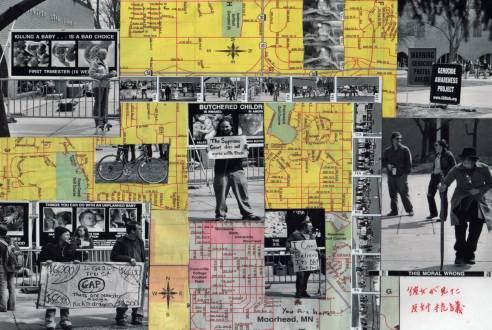
From The New College of Sociological Pataphysics: Sub-Imagery
Ą
From the New
College of Sociological Pataphysics: Framing What She Saw at the Protest (Collage ’08)

[Framing What She Saw at the Protest is a photographic collage of a recent –and very rare- event that took place on the campus of Minnesota State University Moorhead in Spring Semester 2008: A demonstration. The pictures and signs in this collage represent two sides of the contentious debate surrounding abortion. The “Genocide Awareness Project” [anti-abortion] protesters were met by a group of spirited counter-protesters. Interestingly, I had student-protestors on both sides of the issue, and some of them appear in this collage. Of course, this artwork is neither meant to support or denigrate either side of the debate. Rather, it is an exemplar of Erving Goffman’s Frame Analysis: how different groups construct an ideological argument (usually around a controversial issue) to persuade or sway ‘the public’ to their understanding of the matter. Framing is crucial to the signs, symbols, and signifiers that appear on this collage and that were present at this protest.]
Ą
“From
the New College of Sociological Pataphysics: Ceteris Paribus.”
(Collage,‘06)
Your heart is in the right place, but your mind tells you otherwise. You know you could be doing more to help, but who has the time. “Society is messed up,” that is the typical refrain. You repeat this maxim to yourself as the homeless boy approaches with outstretched dirty hand and greedy looking eyes. But you are a tourist, a vacationer who is here to enjoy the banal spectacle of Otherness. Ceteris Paribus: One’s banality is another’s jamboree. Your heart counsels to give, but your mind tells you otherwise. And YOU [the reader] know this feeling only too well, of pulling up to the stoplight and averting your gaze from the homeless woman with the cardboard sign: “Will work for food, a little water, and heartfelt conversation.” Society is messed up.
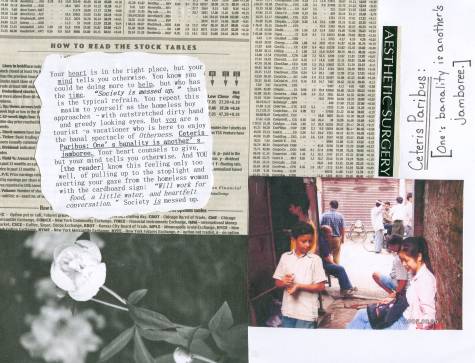
Ą
“From
the New College of Sociological Pataphysics: Fake Dualisms.”
(Collage,‘06)
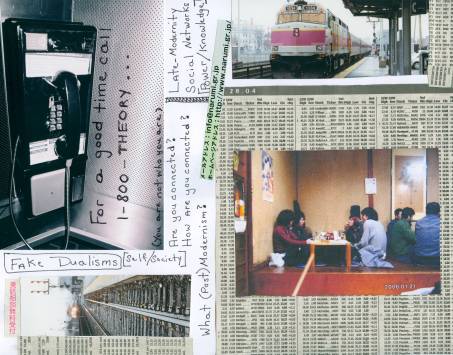
Ą
“From
the New College of Sociological Pataphysics: Protean Self.”
(Collage,‘04)
Protean
Self:
 It
is about time. It is about you. In your purse, there is a
passport, a boarding pass, three credit cards, and some greenbacks. You (want
to) leave tomorrow.
But today, you need a theory that explains why now is the
perfect time to go.
It
is about time. It is about you. In your purse, there is a
passport, a boarding pass, three credit cards, and some greenbacks. You (want
to) leave tomorrow.
But today, you need a theory that explains why now is the
perfect time to go.
______________________________
It
is about the choices you've made, both (ir)rational and strategic ones. Your
present life is the sum of past choices –and you know this only too well.
______________________________
It
is about you and your confused and vacillating identity: a protean self
perfectly suited for the contours of late-modernity.
______________________________
It
is about change. It is about you. How fast can you run from your past? How close
is
your present life to the one you left behind –the one you would soon forget?
______________________________
In
your purse are the requisite tools to colonize a vastly different future.
Will you? (And if no, why not?)
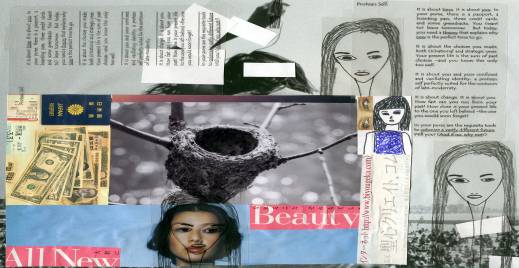
Ą
“From
the New College of Sociological Pataphysics: Banality.”
(Collage,‘05)
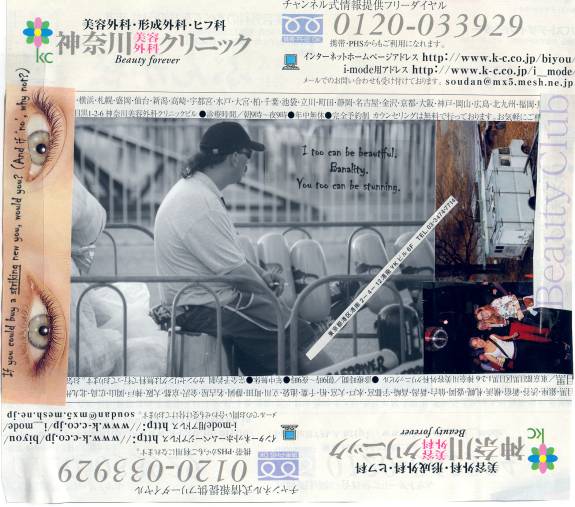
Ą
“From
the New College of Sociological Pataphysics: "Do you know the
code?.”
(Collage,‘05)

Ą
“If
you could buy your freedom, would you?” (Collage ’03. The New College
of Sociological Pataphysics)
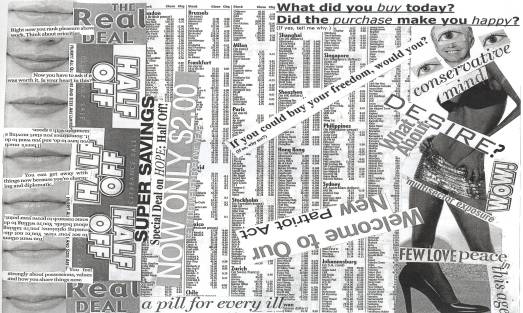
Ą
Desire: The New College of Sociological Pataphysics ('03)
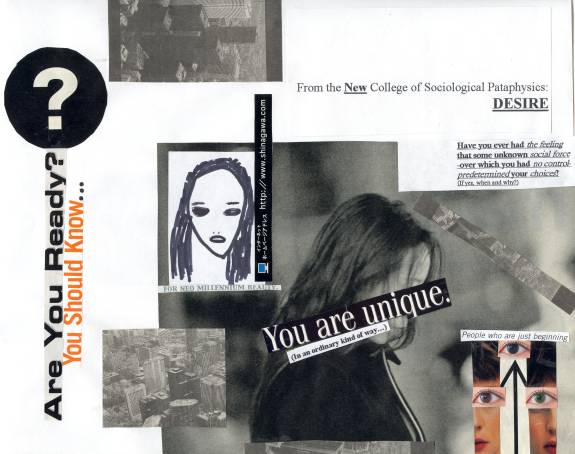
Ą
From the New College of Sociological Pataphysics:
Personal Anomie ('04)

Ą
From the New College of Sociological Pataphysics:
Behind these Windows ('04)

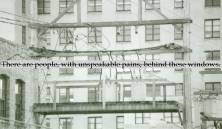

Ą
From the New College of Sociological Pataphysics:
"It's Morality!" ('03)
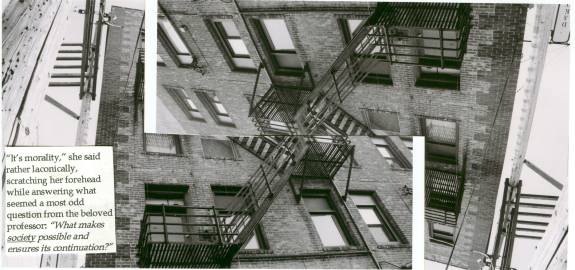
Ą
From the New College of Sociological Pataphysics: CommandControlCommunication ('03)






commandcontrolcommunicationcommmandcontrolcommunicationcommandcontrolcommunicationcommand controlcommunicationcommandcontrolcommunicationcommandcontrolcommunicationcommandcontrol communicationcommandcontrolcommunication
Ą
"Fleshy Words"/Random Thoughts: (Dis)autobiography (or, Dirty Talking w/Wittgenstein)

This collage, by itself, does not exist! (No)thing exists by/in-itself. Yet, these random thoughts, in existing for Ot(her)s, become embodied with flesh. In an essay entitled Toward A (Dis)autobiographical Method, in the book Death at the Parasite Cafe: Social Science (Fictions) & The Postmodern, Stephen Pfohl calls for the deployment of "power-reflexive (w)riting practices" that might "better make connections between the immediacy of autobiographical experiences and the HIStorical spaces within which these experiences might be best critically re-membered" (1992: 80). [Or, dis/membered?] In heeding this call, [i] am seeking a critical, yet power-reflexive de/construction of my HIStorical and topical biographical situated-ness: those in(he)rited and achieved privileges, those in(he)rited or ascribed subalternities.
A (dis)autobiographical method is perilously grounded upon a crude -if not suicidal- program of re(w)riting one's biography within the confines of a once hidden, now exposed, (HIS)torical space. To w(rite) (dis)autobiographically is to initiate symbolic suicide, to die to self, or to be "born-again" as in the Christian sense, because in situating one's self within (without?) the ritual production, accumulation, and distribution of hyper-capital, ultra-modern social forms of power, exploitation, and anomie, is to commit biographical negation: "I am not i" (Minha 1989). But who am [i/I] really? And where am [i] situated within (without?) this stream of fatal symbolic exchanges that has so skillfully masked and transformed estrangement, anomie, and alienation into the most sought after and desired commodities (seductions?) in ultra/modern societies? Moreover, how am [I] symbolically, ritually, materially, and biographically doubling (re/presenting?) the "new" forms of capital in my social exchanges?
[Spiderman is dead!]
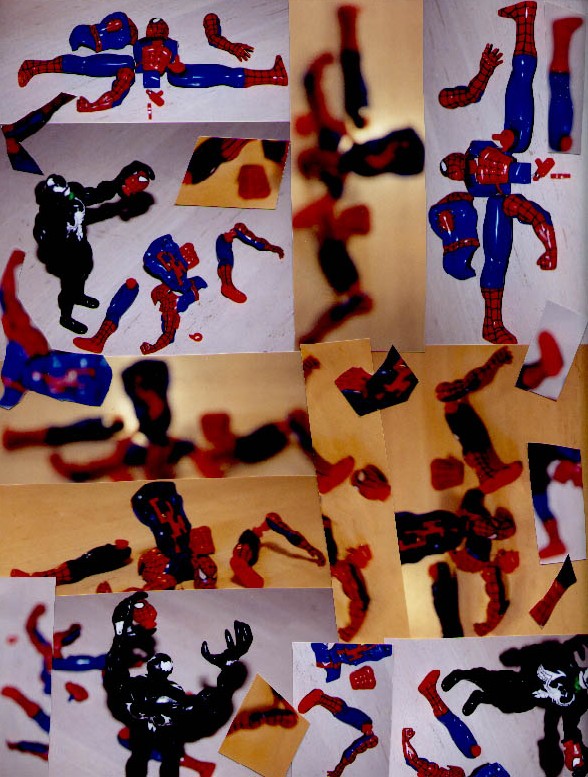
To (w)rite (dis)autobiographically, it seems to me, is to critically double-back upon those privileges "WE" hold so dear, while simultaneously re-membering those forms that have been so cleverly denied. It is hard to (w)rite (dis)autobiographically -or so my students tell me. The difficulty is that (dis)autobiography, and its companion project of reflexivity, demands a phenomenological competence (or awareness) that boldly calls into question all of the taken-for-granted (ass)umptions that have framed -and continues to frame- our social standpoint in reference to the Other [whomever the Other is]. At times, this phenomenological competence forces us to question, indeed negate, all of the ideological (read: religious, political, social) constructs that our fathers (mothers?) so deliberately transcribed upon our minds. At others, it calls into question our own (rationally?) constructed visions of the Other. Whatever its program, (dis)autobiography is always suicidal: "WE" cannot study ourselves without at once changing ourselves -[i] believe "they" refer to this as the Hisenberg Principle. [I] cannot study [i] without changing [I]. [i] cannot study [I] without changing [i]. Yet, this is not to suggest that "WE" become more power-reflexive, critical, and/or "good" for having undergone (dis)autobiography. After all, there have been far too many HIStorical parasites who were supposedly "self-examined": "We hold these truths to be self-evident, that all MEN..."
[Pedagogy: for the 'Liberated']

Here is an epiphanic query: When [i] ask students to (w)rite essays that reflexively and critically interrogate aspects of their biographies that have been, consciously or not, racialized, gendered, commodified, and compulsively sexualized, am [i] (implicitly?) beseeching them to change those (undesirable?) aspects of their biographies? And if so, who gives me this privilege to call for personal change in Others when [I] find it so difficult to initiate change in my own intimate interactions? ["In what sort of circumstances should we ask anyone: 'What actually went on in you as you imagined this?' -And what sort of answer do we expect?" -Wittgenstein, Philosophical Investigations, # 394].
[M(other)ing]

[i] am my mother's son. [I] am my father's son. And [I/i] am especially privileged for this. My biographical and biological positioning as MALE affords me this privilege -one that [I] often take for granted, if not mostly ignore; but, nonetheless, one that [I/i] ALWAYS seem to benefit from. Moreover, [I] am doubling an HIStorical position of privilege in my consumption, distribution, and allocation of a scarce parasitical commodity [The American Dream?] that once was afforded to Euro-American males at the exclusion of ALL Others. My socioeconomic positions, as a member of the conspicuously consuming (overspent?) middle-class and as an affiliate of the "community of scholars" (read: DISENGAGED), afford "voice" [no matter how cantankerous].
[Daddy, daddy, daddy! Can "WE" go to Toys-R-Us? Daddy, daddy, daddy! Can "WE" go to Chucky-Cheese? I wanna play with Chucky? I wanna... Please daddy? Yes!?! Yes!!! Thank you daddy. I love you daddy.]
[I] am a "good" daddy -ritually and magically doubling all of the tele-communicative signs of happiness for my son: Now you see it, now you have it! Yeah, the commodity is a strange thing. And at four years old, my son is already every parasitical marketer's dream: he is not only brand conscious, but fiercely brand loyal. His toys must come from Toys-R-Us, and the characters on his clothes and shoes must mirror those on television -preferably the POWERpuff-Girls, Elmo, Doug, and/or Arthur. "THE MATRIX HAS YOU!", "RESISTANCE IS FUTILE!", "SLAVERY IS FREEDOM!", are all popular maxims that express a common theme: "WE" have been (telegenetically?) infected by a viral strain of ULTRA-MODERNITY. Now, my son wants to visit the "HAPPIEST PLACE ON EARTH" -the "desert of the real itself" said Baudrillard. [i] must resist. Perhaps [I] will commence the resistance (movement?) after a face-to-face talk with Mickey. My son would really appreciate this.
[Deep Pain]

[Why, Ludwig, am [i] so afraid?] "It often happens that we only become aware of the important facts, if we suppress the question "why?"; and then in the course of our investigations these facts lead us to an answer." -Wittgenstein, Philosophical Investigations # 471. [Then, perhaps I should restate the question: What is the 'essential' quality of fear, and would a description satisfy my initial query?] "We should distinguish between the object of fear and the cause of fear." -Wittgenstein, Philosophical Investigations # 476. [i] am afraid of [I]; of what [i] am becoming in [I]. A dear friend once said to me, "Lee, my biggest fear is that [I] can never go back!" He was referring to the experience of leaving the ghetto for "self-advancement" only to find that he had become so estranged from the community he'd left behind. This fear (pain?) is deeply sociological, Ludwig. [i/"WE"] am/are afraid, and no level of syntaxical manipulation can alleviate that fear. ["We ask 'What does I am frightened really mean, what am I referring to when I say it?' And of course we find no answer, or one that is inadequate. The question is : 'In what sort of context does it occur?'" -Wittgenstein, Philosophical Investigations, IIix.
[M(other) Land: "Do you remember the days of slavery?" -Burning Spear]
How can [I/i] forget the days of slavery when every thing and (no)thing is a reminder of it? [I] want to forget. [i] need to remember. [I/i] possess a 'double/consciousness' because of it, neatly hidden behind my 'White/Mask'. In St. Croix, my m(other) land, all of our national parks and HIStoric monuments are unapologetically linked to the historic shitstem of chattel slavery -the skin trade. An HIStorical curse, some have argued, whose sole purpose is to remind "US" (I/i/you/he/she/"WE") of "OUR" racialized position. No wonder so many of my peers despised HIStory in secondary school. Slave memories are NOT sublime but painful; and like all painful remembrances, "WE" seek to forget (repress?). Yet, "WE" remain deeply pained. ["Could someone understand the word "pain", who had never felt pain? -Is experience to teach me whether this is so or not? -And if we say "A man could understand pain without having sometime felt it" -how do we know? Haw can it be decided whether it is true? -Wittgenstein, Philosophical Investigations # 315.] This pain is not of the ordinary variety, Ludwig. It's not akin to suffering on biologic or psychogenic orders, which can be easily localized for treatment and over/medicalization. Neither is it a pain whose symptoms, if and when they do appear, are monolithic. This pain is deeply sociological. "IT'S A BLACK THANG, YOU WON'T UNDERSTAND IT!" was a popular aphorism in the early 1990s that attempted to express this deep sociological wound. But, as with most popular sayings, very few understood the meaning (pain?) that the phrase was communicating. What was truly ironic was that this phrase, which was birthed in b(lack) pain, soon became a sought-of mantra for both b(lack) and w(hit)e youths: thousands, or so it seemed to me at the time, were wearing buttons and t-shirts with the phrase. The commodity is a strange thing. It's funny how b(lack) pain seems to be one of the most marketable aspects of symbolic culture in ultra-modernity. Marvin would cry a river of tears if he knew that his revolutionary opus to b(lack) agony, What's Going On?, is now employed to market cellular phones, satellite dishes, and computers. The commodity is a strange thing. Hyper/capital, over/developed, and ultra/modern systems of cybernetic exchanges and feedback demand the commodification of ALL things, both material and non, from love to sex to hate to pain. If it has a cybernetic impulse (use-value?), then it should be treated as an e(con)omic good. The more painful, the more profitable; the more alienated and estranged, the more marketable and powerful. "YOUR PAIN IS YOUR GREATEST COMMODITY!!!" Out of pain, RAP, HOUSE, TRANCE, REGGAE, JAZZ, BLUES, TOURISM, CALYPSO... These are but a small sampling of the successful commodification of b(lack) agony: "IF YOU ONLY KNEW!"
[Dirty Talking w/Wittgenstein]
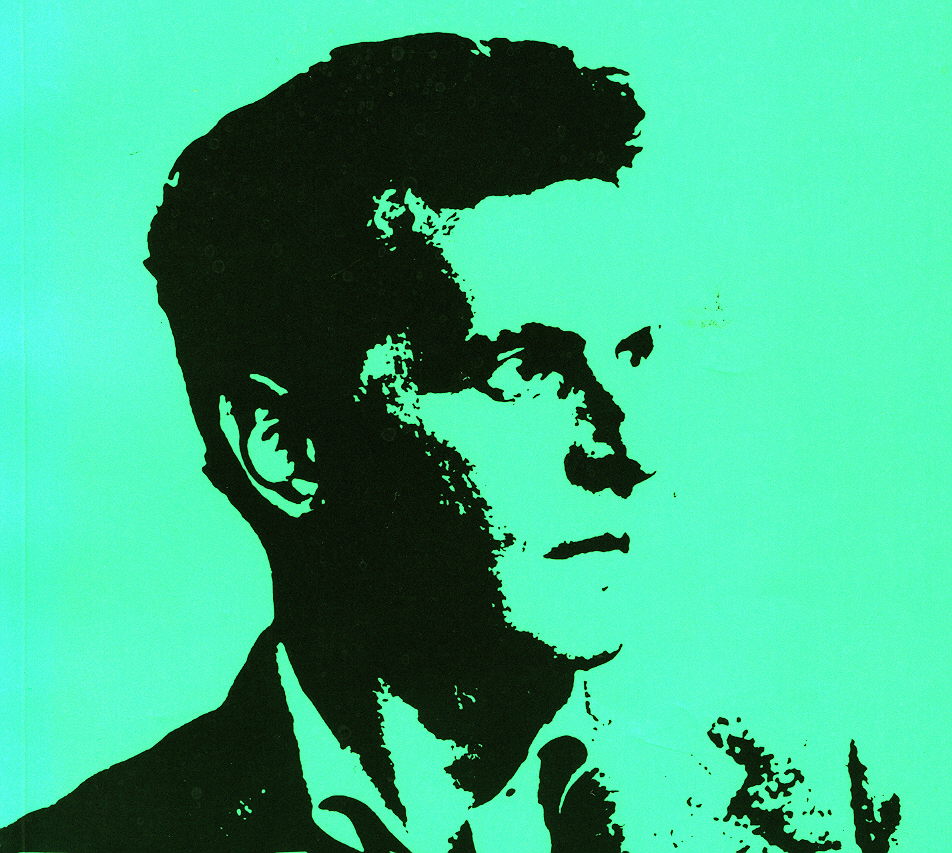
["There is a lack of clarity about the role of imaginability in our investigation. Namely about the extent to which it ensures that a proposition makes sense." -Wittgenstein, Philosophical Investigations # 395]. To ask our signifiers/thoughts/ideologies/PAINS/and concepts to make sense, within or without the confines of imaginability, is, in a word, unimaginable. Our signifiers, and by logic, our propositions, are inadequate: [I] never say what [I] mean; [i] am too afraid to express what -and how- [i] feel. It is not the 'problem' of imaginability that is confounding communicative competence today; rather, it is that pure imaginability, itself, has been dis-placed in late modernity. [I] need not 'imagine' what deep-pain is to you when your deep-pain has been so cleverly and ritualistically commodified and mass-marketed. In my consumption (eating?) of your deep-pain, imaginability becomes irrelevant........
Works Cited:
Jean Baudrillard. 1988. "Simulacra and Simulations: Disneyland." In Mark Poster (Editor) Jean Baudrillard: Selected Writings. Stanford University Press.
Minh-ha, Trinh T. 1989. Woman, Native, Other: Writing, Postcoloniality, and Feminism. Bloomington: Indiana University Press.
Pfohl, Stephen. 1992. death at the parasite cafe: Social Science (Fictions) & The Postmodern. St. Martin Press.
Wittgenstein, Ludwig. 1958. Philosophical Investigations. Blackwell.